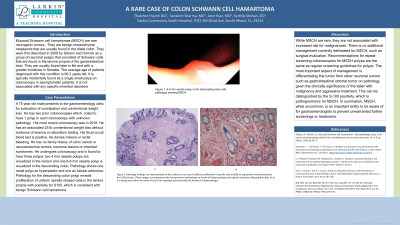Tuesday Poster Session
Category: Colon
P3703 - A Rare Case of Colon Schwann Cell Hamartoma
Tuesday, October 29, 2024
10:30 AM - 4:00 PM ET
Location: Exhibit Hall E

Has Audio
- TH
Thatcher Huynh, DO
Larkin Community Hospital
South Miami, FL
Presenting Author(s)
Thatcher Huynh, DO1, Amir Riaz, MD1, Sanskriti Sharma, MD1, Karthik Mohan, DO2
1Larkin Community Hospital, South Miami, FL; 2Larkin Community Hospital, Hialeah, FL
Introduction: Mucosal Schwann cell hamartomas (MSCH) are rare neurogenic tumors. They are benign mesenchymal neoplasms that are usually found in the distal colon. They were first described in 2009 by Gibson and Hornick as a group of neuronal polyps that consisted of Schwann cells that are found in the lamina propria of the gastrointestinal tract. They are usually found later in life and with a greater incidence in females. The average age of patients diagnosed with this condition is 60.2 years old. It is typically incidentally found as a single small polyp on colonoscopy in asymptomatic patients. It is not associated with any specific inherited disorders.
Case Description/Methods: A 75 year old male presents to the gastroenterology clinic for evaluation of constipation and unintentional weight loss. He has two prior colonoscopies which, noted to have 1 polyp in each colonoscopy with unknown pathology. His most recent colonoscopy was in 2016. He has an associated 25 lb unintentional weight loss without evidence of anemia on laboratory testing. His fecal occult blood test is positive. He denies melena or rectal bleeding. He has no family history of colon cancer or neuroendocrine tumors, neuronal lesions or inherited syndromes. He undergoes colonoscopy and is found to have three polyps; two 4 mm sessile polyps are visualized in the rectum and one 6-8 mm sessile polyp is visualized in the descending colon. Pathology shows one rectal polyp as hyperplastic and one as tubular adenoma. Pathology for the descending colon polyp reveals proliferation of uniform spindle shaped cells in the lamina propria with positivity for S100, which is consistent with benign Schwann cell hamartoma.
Discussion: While MSCH are rare, they are not associated with increased risk for malignancies. There is no additional management currently delineated for MSCH, such as surgical evaluation. Recommendations for repeat screening colonoscopies for MSCH polyps are the same as regular screening guidelines for polyps. The most important aspect of management is differentiating this tumor from other neuronal tumors such as gastrointestinal stromal tumor on pathology, given the clinically significance of the latter with malignancy and aggressive treatment. This can be distinguished by the S-100 positivity, which is pathognomonic for MSCH. In summation, MSCH, while uncommon, is an important entity to be aware of for gastroenterologists to prevent unwarranted further screenings or treatments.
Disclosures:
Thatcher Huynh, DO1, Amir Riaz, MD1, Sanskriti Sharma, MD1, Karthik Mohan, DO2. P3703 - A Rare Case of Colon Schwann Cell Hamartoma, ACG 2024 Annual Scientific Meeting Abstracts. Philadelphia, PA: American College of Gastroenterology.
1Larkin Community Hospital, South Miami, FL; 2Larkin Community Hospital, Hialeah, FL
Introduction: Mucosal Schwann cell hamartomas (MSCH) are rare neurogenic tumors. They are benign mesenchymal neoplasms that are usually found in the distal colon. They were first described in 2009 by Gibson and Hornick as a group of neuronal polyps that consisted of Schwann cells that are found in the lamina propria of the gastrointestinal tract. They are usually found later in life and with a greater incidence in females. The average age of patients diagnosed with this condition is 60.2 years old. It is typically incidentally found as a single small polyp on colonoscopy in asymptomatic patients. It is not associated with any specific inherited disorders.
Case Description/Methods: A 75 year old male presents to the gastroenterology clinic for evaluation of constipation and unintentional weight loss. He has two prior colonoscopies which, noted to have 1 polyp in each colonoscopy with unknown pathology. His most recent colonoscopy was in 2016. He has an associated 25 lb unintentional weight loss without evidence of anemia on laboratory testing. His fecal occult blood test is positive. He denies melena or rectal bleeding. He has no family history of colon cancer or neuroendocrine tumors, neuronal lesions or inherited syndromes. He undergoes colonoscopy and is found to have three polyps; two 4 mm sessile polyps are visualized in the rectum and one 6-8 mm sessile polyp is visualized in the descending colon. Pathology shows one rectal polyp as hyperplastic and one as tubular adenoma. Pathology for the descending colon polyp reveals proliferation of uniform spindle shaped cells in the lamina propria with positivity for S100, which is consistent with benign Schwann cell hamartoma.
Discussion: While MSCH are rare, they are not associated with increased risk for malignancies. There is no additional management currently delineated for MSCH, such as surgical evaluation. Recommendations for repeat screening colonoscopies for MSCH polyps are the same as regular screening guidelines for polyps. The most important aspect of management is differentiating this tumor from other neuronal tumors such as gastrointestinal stromal tumor on pathology, given the clinically significance of the latter with malignancy and aggressive treatment. This can be distinguished by the S-100 positivity, which is pathognomonic for MSCH. In summation, MSCH, while uncommon, is an important entity to be aware of for gastroenterologists to prevent unwarranted further screenings or treatments.
Disclosures:
Thatcher Huynh indicated no relevant financial relationships.
Amir Riaz indicated no relevant financial relationships.
Sanskriti Sharma indicated no relevant financial relationships.
Karthik Mohan indicated no relevant financial relationships.
Thatcher Huynh, DO1, Amir Riaz, MD1, Sanskriti Sharma, MD1, Karthik Mohan, DO2. P3703 - A Rare Case of Colon Schwann Cell Hamartoma, ACG 2024 Annual Scientific Meeting Abstracts. Philadelphia, PA: American College of Gastroenterology.
